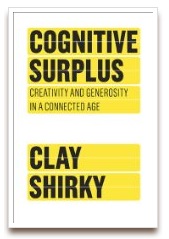There are a handful of people I regularly read in an effort to understand what’s happening in the world: Scott Adams, Seth Godin, Clay Shirky, Bruce Sterling, William Gibson and Terry Heaton (I’ve left some out).
In this essay, Mr. Heaton explores what he calls the “second Gutenberg moment” we are experiencing:
“It isn’t technology that’s changing culture as much as it is the ability of people to act on long-held dissatisfaction. People, therefore, are the issue, empowered, connected and, yes, angry people. Nobody’s “in charge” of the revolution underway, but more and more people are realizing that if we’re going to fix what’s wrong, we’re going to have to do it ourselves.”
We’re sure to see some of that in November. And then there’s the question of who controls the knowledge:
“One-directional authority — especially that which is based in deliberately protected knowledge — cannot maintain control for long, once that knowledge is acquired and spread throughout its constituency. All that we know today in terms how we govern our lives will evaporate and be replaced by something very different in the decades to come.”
We see this in every institution: Busines, Religion, Education, Media, Medicine, Finance. I was certainly “guilty” of this when I was a Manager. Deciding what information got passed along and to whom. I still see it every day. But it’s getting harder.
Employees are connected. Nobody is walking around the office leaving memos on people’s desks. Email, Facebook, Twitter, texting… shit, the boss is often the last know something.
I’m confident I’ll be around for the disruptions to come and expect many will be painful, but necessary. I’m looking forward to them.

